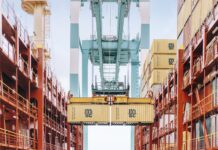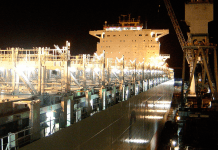
“Just ten months into 2024, shipyards’ deliveries of container ships have reached a new annual record. A total of 410 ships with a capacity of 2.5 million TEUs have been delivered, surpassing the previous full-year high of 2.3 million TEUs in 2023,” stated Niels Rasmussen, Chief Shipping Analyst at BIMCO.
As recycling of older ships has remained low, the deliveries have increased the size of the container fleet by 2.4 million TEUs (8.7%) since the beginning of 2024. The container fleet now consists of 6,699 ships with a capacity of 30.4 million TEUs.
It has grown 32% since early 2020 as 7.8 million TEUs have been delivered during the first half of the decade, which is the most during any five-year period.
“Despite the rapid expansion of the fleet, owners continue to add orders for new ships. So far this year, contracting is already more than double that of last year’s total and 286 ships with a capacity of 3.3 million TEUs have been added to the order book. The order book dipped to 5.9 million TEUs in early June but is now back at 7.6 million TEUs, 25% of the size of the total fleet,” stated Rasmussen.
Though the order book is currently marginally smaller than the 7.8 million TEU record from early 2023, it is worth noting that the operating owners’ order book is at a record high of 5.9 million TEUs.
Operating owners control 78% of the order book but only 60% of the fleet and will therefore see their fleet continue to grow faster than non-operating owners. So far this decade, operating owners’ fleet have grown 41% whereas non-operating owners’ fleet have grown only 18%.
Ships with a capacity between 12,000 and 17,000 TEUs have driven 42% of the capacity growth since early 2020 and will also be the main driver of growth in the coming years as they contribute 47% of the capacity in the order book. Ships larger than 17,000 TEUs have contributed 25% of fleet growth in the 2020s and make-up 27% of the order book’s capacity.
Another 500,000 TEUs are scheduled to be delivered during the rest of 2024, driving deliveries for the year close to 3 million TEUs. During the next four years, an average of 1.7 million TEUs are scheduled to be delivered each year and 300,000 TEUs are already planned for delivery in 2029. However, additional ships for delivery in the next five years can still be ordered.
“As mentioned, the order book to fleet ratio is currently 25% but actual fleet growth will depend on future recycling. After a few years of very low recycling, 3.4 million TEUs will be more than 20 years old next year and prime candidates for recycling in the coming years. If they are all recycled during the next five years, fleet growth from the current order book can be limited to 14%,” commented Rasmussen.

This article was written by Niels Rasmussen, Chief Shipping Analyst at BIMCO





